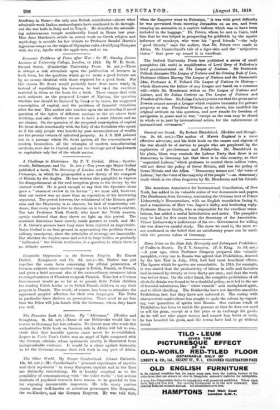Some Notes on the State Sale Monopoly and Subsequent Prohibition
of Vodka in Russia. By J. Y. Simpson. (P. S. King. la. 6d. net.) —A year ago, when Professor Simpson prepared this valuable pamphlet, every one in Russia was agreed that Prohibition, decreed by the late Tsar in July, 1914, had had most beneficial effects. The figures which he quotes are remarkable. In 1916, for example, it was stated that the productivity of labour in mills and factories had increased by twenty or even thirty per cent., and that the work was better done. On the other hand, the complete prohibition of all alcoholic drinks was found to be a doubtful policy, as it led to the use of harmful substitutes, hire " white varnish" and methylated spirit, and to illicit distilling. The Bolsheviks have not dared to annul the Prohibition law, but they have- not enforced it. The enemy with characteristic malevolence has sought to undo the reform by export- ing vast quantities of spirits into Russia. One curious result of Prohibition has been to enrich the peasant so that he does not need to sell his grain, except at a fair price or in exchange for goods. As he will not take paper money and cannot buy boots or tools, he has hoarded his grain, and the towns have had to go without bread.


























 Previous page
Previous page